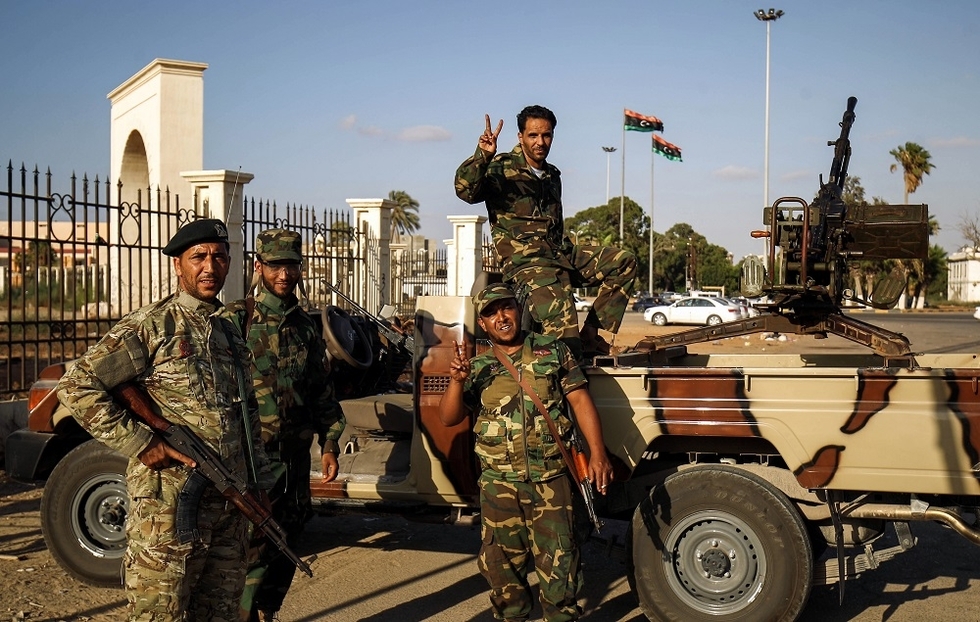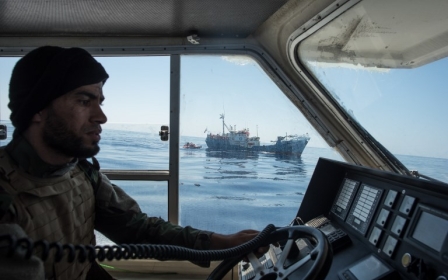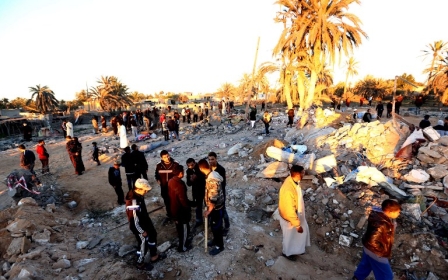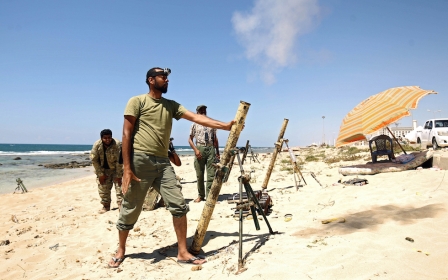Libyan forces launch air attacks on emboldened IS fighters

East Libyan forces said they had launched air strikes on Islamic State (IS) group fighters after the militants made incursions south and east of their former coastal stronghold of Sirte.
IS has grown bolder in recent weeks, setting up temporary checkpoints, attacking local forces, and taking over village mosques to lead prayers during the Muslim holiday of Eid al-Adha, Libyan officials say.
The increased activity has raised concern that IS could regroup around Sirte, from where it was driven out in December by local forces and a US air campaign.
Most militants were killed in the nearly seven-month battle, but an unknown number fled into the desert.
Sirte lies at the centre of Libya's Mediterranean coastline, on the dividing line between regions controlled by rival Libyan factions.
Forces loyal to eastern-based commander Khalifa Haftar said they had carried out air strikes on Sunday against militants in the area of Ain Tarqft, between Sirte and the town of Waddan, 230km to the south.
Both Haftar's Libyan National Army (LNA) and forces from the port city of Misrata, which led the campaign in Sirte last year, say they are carrying out frequent patrols to monitor IS movements in the area.
The LNA and Misratan brigades have been on opposite sides of a conflict that developed after the Nato-backed uprising that toppled the Libyan leader, Muammar Gaddafi, in 2011.
Islamic State exploited the turmoil to establish a foothold in Libya, taking complete control of Sirte in 2015 and using it as a base for hundreds of foreign fighters.
French FM arrives in Libya
French Foreign Minister Jean Yves Le Drian met with Libyan officials in Tripoli on Monday to offer support for a deal between political rivals signed in Paris aimed at stabilising the country.
Libyan Prime Minister Fayez al-Seraj and the divided nation's eastern commander Khalifa Haftar in July committed to a conditional ceasefire and to work towards elections, but the agreement did not include other key factions.
Western governments, worried about Islamist militants and smugglers thriving in Libya's chaos, are pushing a broader UN-backed deal to unify Libya and end the instability.
In Tripoli, Le Drian met Seraj and planned talks with Abdulrahman Swehli, a politician connected to some of Haftar's rivals who heads a parliamentary council in the capital, Libyan officials said.
Le Drian is also to visit Misrata, Swehli's home city and a base of opposition to Haftar, before heading to Benghazi to meet Haftar and to Tobruk to meet the head of an eastern-based parliament that backs him.
The French minister's visit is in line with President Emmanuel Macron's push for a deeper French role in bringing Libyan factions together in the hope of countering militant violence and easing Europe's migrant crisis.
"Our objective is the stabilisation of Libya in the interests of the Libyans themselves," Le Drian said in a statement in Tripoli.
"A united Libya, equipped with functioning institutions, is the condition for avoiding the terrorist threat in the long term."
He said the Paris deal was meant to support the UN-backed accord for a government of national unity.
Past Western attempts to broker agreements have often fallen victim to political infighting among rival factions and armed brigades vying for power in the OPEC oil producer.
Seraj's government has struggled to impose control and its presidential council is divided. Haftar has refused to accept its legitimacy. He has been gaining ground, backed by allies Egypt and United Arab Emirates.
New MEE newsletter: Jerusalem Dispatch
Sign up to get the latest insights and analysis on Israel-Palestine, alongside Turkey Unpacked and other MEE newsletters
Middle East Eye delivers independent and unrivalled coverage and analysis of the Middle East, North Africa and beyond. To learn more about republishing this content and the associated fees, please fill out this form. More about MEE can be found here.




